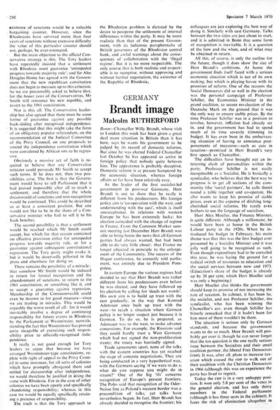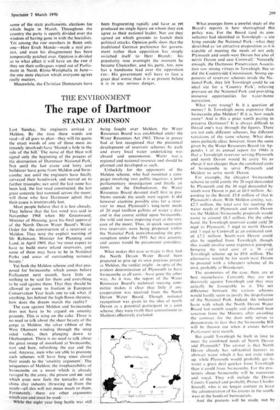GERMANY
Brandt image
Malcolm RUTHERFORD
Bonn—Chancellor Willy Brandt, whose visit to London this week has been given a great deal more attention in Britain than it has here, says he wants his government to be judged by its record of domestic reforms. But since he was elected Federal Chancellor last October he has appeared so active in foreign policy that nobody quite believes him. The appearance is probably deceptive. Domestic reform is at present hampered by the economic situation, whereas foreign affairs so far have been relatively easy.
As the leader of the first socialist-led government in post-war Germany, Herr Brandt is out to show that he really is different from his predecessors. His foreign policy aim is 'co-operation with the west, and understanding with the east', which is itself unexceptional. In relations with western Europe he has been extremely lucky; his election coincided with the change of regime in France. From the Common Market sum- mit meeting last December Herr Brandt was able to bring home the news that all German parties had always wanted, but had been able to do very little about: that France no longer objected in principle to the enlarge- ment of the Community. The success of the Hague conference, he correctly told parlia- ment, was entirely due to President Pom- pidou.
In eastern Europe the various regimes had decided to say that Herr Brandt was rather different from his predecessors even before he was elected, and they have followed up his election by calling for 'deeds not words'. His own aim is to build up trust with the east gradually, in the way that Konrad Adenauer once built up trust with the west—to reach a situation where German policy is no longer suspect just because it is German. To do so, he is prepared, as Adenauer was to the west, to make advance concessions. For example, the Russians-said they could hardly trust a West Germany which had not signed the non-proliferation treaty; the treaty was hurriedly signed.
Trade agreements apart, none of the talks with the eastern countries has yet reached the stage of concrete negotiations. They are being conducted in a very hypothetical way, with the Germans saying 'if we were to do x, what do you suppose you might do in return?' One of the big 'ifs' concerns recognition of Europe's present frontiers.
The Poles said that recognition of the Oder- Neisse line as Poland's western border was a precondition of talks, yet talks have nevertheless begun. In fact, Herr Brandt has already decided to recognise the frontier; his colleagues are just exploring the best way of doing it. Similarly with east Germany. Talks between the two sides are just about to start, and it is admitted in Bonn that some form of recognition is inevitable. It is a question of the how and the when, and of what may be obtained in return.
All this, of course, is only the outline for the future, though it does show the size of Herr Brandt's ambitions. At home the government finds itself faced with a serious economic situation which is not of its own making, but which is playing havoc with its promises of reform. One of the reasons the Social Democrats did so well in the election was the personal campaign of Professor Schiller, the Economics Minister in the grand coalition, to secure revaluation of the Deutsche Mark on the ground that it was the only way to ensure stable prices. By the time Professor Schiller was in a position to revalue, however, inflation had already set in, and the government has had to spend much of its time severely trimming its budget. It has even been in the embarrass- ing situation of having to announce post- ponements of measures—such as cuts in taxation—promised in Herr Brandt's very first speech as Chancellor.
The difficulties have brought out an in- teresting clash of personalities within the party. Professor Schiller is not easily recognisable as a Socialist. He is basically a syndicalist, who believes that the best way to progress is to get all sections of the com- munity (the 'social partners', he calls them) round a table together and co-operate. He also wants to keep his promise of stable prices, even at the expense of ditching long- cherished social reforms. He rarely even bothers to use the language of socialism.
Herr Alex Moeller, the Finance Minister, is quite different. Although a millionaire, he would have been at home in the British Labour party in the 1920s. When he in- troduced his budget in February, his main theme was that this was the first budget ever presented by a Socialist Minister and it was jolly well going to be recognised as such. Even though expenditure had to be curtailed this year, he was laying the ground for a radical switch of resources to education and the social services between now and 1973. (Education's share of the budget is already up by 36 per cent, which Herr Moeller said was only a beginning.) Herr Moeller also thinks the government should keep its promise of not increasing the rate of taxation. In cabinet, it has been he, the socialist, and not Professor Schiller, the syndicalist, who has been winning the Chancellor's ear, even though Schiller has bitterly remarked that if it hadn't been for him most of them wouldn't be there.
The situation is serious only by German standards, and because the government wants to do so much. Herr Brandt will pro, bably get over it, though he can never forget that the tax question is the one really serious issue between the Socialists and their small coalition partner, the liberal Free Democrats (mil. It was, after all, plans to increase tax-
ation which caused the FDP to walk out of their coalition with the Christian Democrats in 1966 (although this was an experience the party has lived to regret). Today the FDP is in a very unhappy posi- tion. It won only 5.8 per cent of the votes in
the general election, and has only thirty members in the Federal parliament (although it has three seats in the cabinet). It faces the risk of elimination altogether in
some of the state parliaments, elections for which begin in March. Throughout the country the party is openly divided over the wisdom of having gone in with the Socialists. Yet among the FOP members in Bonn only one—Herr Erich Mende—made a real pro- test, and even his disagreement has been temporarily patched over. Opinion is divided as to what effect it will have on the FDP if they see their colleagues wiped out of Parlia- ment in North Rhine-Westphalia in June— the one state election which everyone agrees really matters.
Meanwhile, the Christian Democrats have
been fragmenting rapidly and have as yet produced no single figure on whom they can agree as their national leader. Nor are they agreed on which grounds to launch their political attacks. Opinion polls show that the traditional German preference for govern- ment rather than opposition has simply switched itself to Herr Brandt: his popularity rose overnight the moment he became Chancellor, and his party, too, now has a handsome lead over the opposition CDU. His government will have to fare a great deal worse than it is at present before it is in -any serious danger,



































 Previous page
Previous page